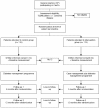The effectiveness of case management for comorbid diabetes type 2 patients; the CasCo study. Design of a randomized controlled trial
- PMID: 21729265
- PMCID: PMC3142502
- DOI: 10.1186/1471-2296-12-68
The effectiveness of case management for comorbid diabetes type 2 patients; the CasCo study. Design of a randomized controlled trial
Abstract
Background: More than half of the patients with type 2 diabetes (T2DM) patients are diagnosed with one or more comorbid disorders. They can participate in several single-disease oriented disease management programs, which may lead to fragmented care because these programs are not well prepared for coordinating care between programs. Comorbid patients are therefore at risk for suboptimal treatment, unsafe care, inefficient use of health care services and unnecessary costs. Case management is a possible model to counteract fragmented care for comorbid patients. It includes evidence-based optimal care, but is tailored to the individual patients' preferences.The objective of this study is to examine the effectiveness of a case management program, in addition to a diabetes management program, on the quality of care for comorbid T2DM patients.
Methods/design: The study is a randomized controlled trial among patients with T2DM and at least one comorbid chronic disease (N=230), who already participate in a diabetes management program. Randomization will take place at the level of the patients in general practices. Trained practice nurses (case managers) will apply a case management program in addition to the diabetes management program. The case management intervention is based on the Guided Care model and includes six elements; assessing health care needs, planning care, create access to other care providers and community resources, monitoring, coordinating care and recording of all relevant information. Patients in the control group will continue their participation in the diabetes management program and receive care-as-usual from their general practitioner and other care providers.
Discussion: We expect that the case management program, which includes better structured care based on scientific evidence and adjusted to the patients' needs and priorities, will improve the quality of care coordination from both the patients' and caregivers' perspective and will result in less consumption of health care services.
Trial registration: Netherlands Trial Register (NTR): NTR1847.
Figures
Similar articles
-
The future of Cochrane Neonatal.Early Hum Dev. 2020 Nov;150:105191. doi: 10.1016/j.earlhumdev.2020.105191. Epub 2020 Sep 12. Early Hum Dev. 2020. PMID: 33036834
-
Case management for patients with poorly controlled diabetes: a randomized trial.Am J Med. 2004 Jun 1;116(11):732-9. doi: 10.1016/j.amjmed.2003.11.028. Am J Med. 2004. PMID: 15144909 Clinical Trial.
-
Effectiveness of the cardiac-diabetes transcare program: protocol for a randomised controlled trial.BMC Health Serv Res. 2017 Feb 2;17(1):109. doi: 10.1186/s12913-017-2043-4. BMC Health Serv Res. 2017. PMID: 28153000 Free PMC article. Clinical Trial.
-
Cluster randomized controlled trial of a peer support program for people with diabetes: study protocol for the Australasian Peers for Progress study.BMC Public Health. 2012 Oct 4;12:843. doi: 10.1186/1471-2458-12-843. BMC Public Health. 2012. PMID: 23035666 Free PMC article. Clinical Trial.
-
Psychological interventions to improve self-management of type 1 and type 2 diabetes: a systematic review.Health Technol Assess. 2020 Jun;24(28):1-232. doi: 10.3310/hta24280. Health Technol Assess. 2020. PMID: 32568666 Free PMC article.
Cited by
-
Stakeholders' perception on the organization of chronic care: a SWOT analysis to draft avenues for health care reforms.BMC Health Serv Res. 2014 Apr 18;14:179. doi: 10.1186/1472-6963-14-179. BMC Health Serv Res. 2014. PMID: 24742204 Free PMC article.
-
Mortality and Cardiovascular Complications in Older Complex Chronic Patients with Type 2 Diabetes.Biomed Res Int. 2017;2017:6078498. doi: 10.1155/2017/6078498. Epub 2017 Aug 10. Biomed Res Int. 2017. PMID: 28856160 Free PMC article.
-
Interventions for improving outcomes in patients with multimorbidity in primary care and community settings.Cochrane Database Syst Rev. 2016 Mar 14;3(3):CD006560. doi: 10.1002/14651858.CD006560.pub3. Cochrane Database Syst Rev. 2016. Update in: Cochrane Database Syst Rev. 2021 Jan 15;1:CD006560. doi: 10.1002/14651858.CD006560.pub4. PMID: 26976529 Free PMC article. Updated.
-
Integrating Undergraduate Patient Partners into Diabetes self-management education: Evaluating a free clinic pilot program for the Underserved.J Health Care Poor Underserved. 2016;27(4):1689-1708. doi: 10.1353/hpu.2016.0156. J Health Care Poor Underserved. 2016. PMID: 27818432 Free PMC article.
-
Interventions for improving outcomes in patients with multimorbidity in primary care and community settings.Cochrane Database Syst Rev. 2021 Jan 15;1(1):CD006560. doi: 10.1002/14651858.CD006560.pub4. Cochrane Database Syst Rev. 2021. PMID: 33448337 Free PMC article.
References
-
- van Oostrom SH, Picavet HSJ, van Gelder BM, Lemmens LC, Hoeymans N, Verheij RA, Schellevis FG, Baan CA. Multimorbiditeit en comorbiditeit in de Nederlandse bevolking - gegevens van huisartsenpraktijken. Ned Tijdschr Geneeskd. 2011;155:A3193. - PubMed
-
- van Dijk CE, Verheij RA, Groenewegen PP, de Bakker DH. Bekostiging huisartsenzorg. Utrecht, NIVEL; 2010.
Publication types
MeSH terms
LinkOut - more resources
Full Text Sources
Medical


